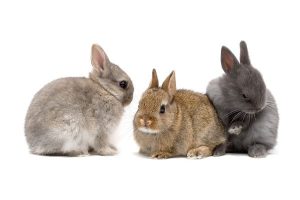
Milk is known for its many benefits which range from stronger bones to teeth to improve the health of our heart. Therefore, it is perfectly reasonable to wonder if bunnies too can drink it just like human beings.
The answer to whether they drink cow’s milk or not is NO. In fact, you should not give your bunnies milke or any dairy product including ice cream, cheese, tea, or yogurt. Note that milk chocolate is poisonous to not only your bunny but also dogs and cats.
On this issue, although we noticed a few resources stating otherwise, they did not have any scientific backing.
Whereas a 2% cow’s milk will not kill your rabbit, it will cause digestive problems since according to Petconsider.com “it is caloric, loaded with fat, and hard for them to digest.” Therefore, giving it a lot more often may make your bunny have health issues.
However, if you have been giving your bunny a little amount, or it just drank some, do not consider it as an emergency that requires you to see your vet. Just watch for any signs that all is not well.
Why can’t rabbits drink cow milk?
By the time rabbits and a majority of mammals reach adulthood, they are intolerant to lactose as well as unable to digest it because they do not produce enough lactase to break lactose.
Young bunnies can take their mother’s milk until they are fully weaned. Afterward, they do not drink it again.
Some of the symptoms to expect if your bunny consumes milk include bloating, indigestion, and diarrhea. Since they cannot vomit the food, they will be struggling to digest it, and as a result, depression, and lethargy are possible.
As already noted, cow’s milk has a lot of calories. However, it has little nutrients meant for rabbits. Therefore, it is possible for your bunny to gain weight and even become obese.
What to feed baby rabbits without a mother
Kits or baby rabbits should depend on their mother’s milk until it completes weaning. This is because it is way much more nutritious than that one from a cow. It has about 15% protein,10% fat, sugar 3%, mineral 2% and the rest is water.
If you have an orphaned baby rabbit, it is recommended you give it the kitten milk replacer (KMR), a formulation whose recipe according to Animals.mom.me, has “high-protein formula made from whey protein, milk, oils, eggs, vitamins, and minerals.” Otherwise, the one from a cow may hurt your kit, and human baby formulas may not be suitable too.
On amounts of KMR to give them, it will depend on their size. Typically, for the first up to one week, give it 2-2.5ml twice per day and increase to 5-7ml for those that are aged between 1-2 weeks. Those 2-3weeks may require 15-30ml, while 3-6weeks about 30ml daily.
Feed them slowly with a syringe. Overfeeding can lead to death or health problem.
If you are interested in KMR, then PetAG KMR - Kitten Milk Replacer is what you need. It is formulated to mimic the queen’s milk in terms of nutritional composition, i.e., fats, proteins, carbohydrates, as well as the needed vitamins and minerals to ensure your baby bunny has optimum growth and development.
It can also be a handy supplement to cats and rabbits as a post-surgery or recovering supplement. For newborns, give them until they are about six weeks.
Besides the KMR, goat’s milk can also be used, but it may need some formulation to make it equally nutritive.



Leave a Reply
You must be logged in to post a comment.